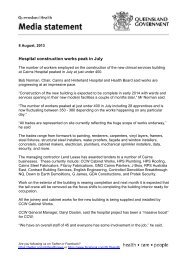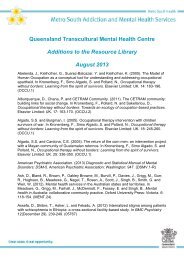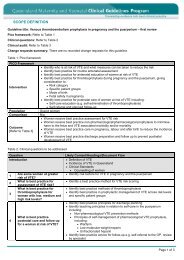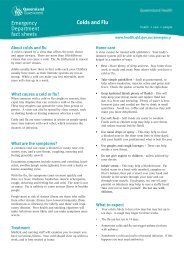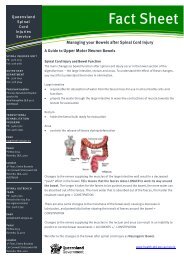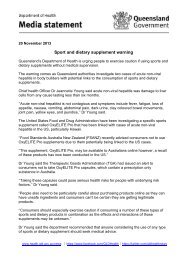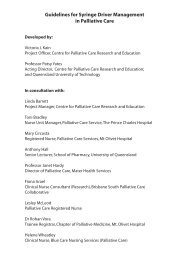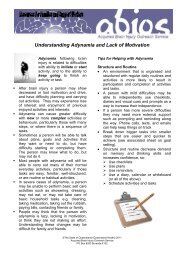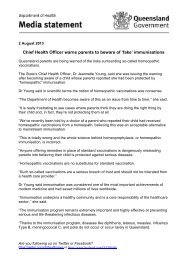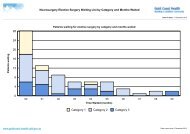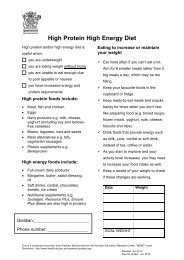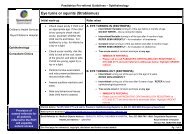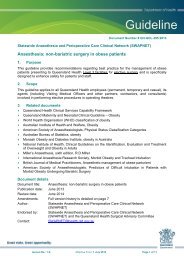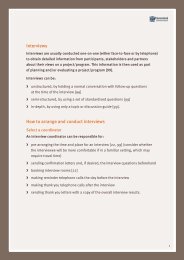Psychoed Package, Anxiety, Royal Brisbane and Women's Hospital
Psychoed Package, Anxiety, Royal Brisbane and Women's Hospital
Psychoed Package, Anxiety, Royal Brisbane and Women's Hospital
Create successful ePaper yourself
Turn your PDF publications into a flip-book with our unique Google optimized e-Paper software.
<strong>Royal</strong> <strong>Brisbane</strong> <strong>and</strong> Women’s <strong>Hospital</strong><br />
Metro North <strong>Hospital</strong> <strong>and</strong> Health Service<br />
Inner North <strong>Brisbane</strong> Mental Health Service<br />
Mental Health Services<br />
ANXIETY<br />
What is <strong>Anxiety</strong>?<br />
<strong>Anxiety</strong> is the automatic physiological <strong>and</strong> physical changes that occur in response to perceived<br />
threat or danger. On awareness of danger, the involuntary nervous system sends immediate<br />
messages throughout our body, to either ‘fight’ (tackle the situation head on) or ‘flight’ (flee from<br />
the situation). This ‘fight or flight’ response is characterised by:<br />
Alert mind<br />
Increased heart rate <strong>and</strong> blood pressure<br />
Increased breathing rate<br />
A feeling of fear or apprehension<br />
Trembling, shaking or a feeling of restlessness<br />
Sensory changes (i.e. - feeling cold, clammy, chills or hot flushes)<br />
Feeling nauseous or butterflies in the stomach<br />
The anxiety response can be very useful in the short term to deal with dangerous or stressful situations.<br />
However, if this reaction does not subside when the threat passes, or is exaggerated, it can be<br />
counterproductive <strong>and</strong> disabling to the individual.<br />
The experience of an anxiety disorder has a significant impact on a person’s thoughts, feelings <strong>and</strong><br />
behaviours, including:<br />
Feeling constantly wound up <strong>and</strong> ‘on edge’<br />
Feeling irritable<br />
Feeling physically unwell<br />
Difficulty concentrating <strong>and</strong> making decisions<br />
Difficulty with relaxing or sleep routine<br />
Constant worrying <strong>and</strong> unable to ‘switching off’ unpleasant thoughts<br />
Difficulty going out, mixing with people<br />
Having negative outlook on yourself <strong>and</strong> the future<br />
Why learn about <strong>Anxiety</strong>?<br />
Having a clear knowledge <strong>and</strong> underst<strong>and</strong>ing of<br />
<strong>Anxiety</strong> Disorders<br />
Treatments<br />
http://creativecommons.org/licenses/by/2.5/au/<br />
© State of Queensl<strong>and</strong> (Queensl<strong>and</strong> Health) 2012<br />
Version No: 01 Effective date: 07/2012 Review date: 07/2014<br />
Page 1 of 7
<strong>Royal</strong> <strong>Brisbane</strong> <strong>and</strong> Women’s <strong>Hospital</strong> Metro North <strong>Hospital</strong> <strong>and</strong> Health Service<br />
How to better manage anxiety symptoms<br />
can lead to greater personal control over the anxiety, thus reducing its impact on quality of life <strong>and</strong> life<br />
roles. This process of acquiring knowledge <strong>and</strong> increasing underst<strong>and</strong>ing of mental illness <strong>and</strong> related<br />
issues is referred to as psychoeducation.<br />
How common are <strong>Anxiety</strong> Disorders?<br />
<strong>Anxiety</strong> disorders are one of the most common mental disorders, with one in four people experiencing<br />
some form of anxiety disorder over their lifetime. People can experience anxiety at any time in life, but it is<br />
more commonly diagnosed in early adulthood.<br />
What Causes an <strong>Anxiety</strong> Disorder?<br />
Causes of an anxiety disorder vary, but are thought to include the following:<br />
Environmental Factors<br />
It is believed that high stress levels can exacerbate or sometimes cause anxiety. Contributory<br />
environmental factors may include social isolation, traumatic events, physical illness, excessive alcohol or<br />
illicit substance use.<br />
Depression<br />
There is a strong link between depression <strong>and</strong> anxiety. A large proportion of people diagnosed with clinical<br />
depression also report symptoms of anxiety, <strong>and</strong> a number of symptoms of depression are similar to those<br />
of anxiety (eg - sleep disturbance, physical aches <strong>and</strong> pains, physical agitation & restlessness).<br />
Genetic Factors<br />
Research indicates that genetics can influence the development of an anxiety disorder. People who have a<br />
close relative with an anxiety disorder have a greater chance of developing it compared to the general<br />
population.<br />
Biochemical Factors<br />
<strong>Anxiety</strong> is associated with a chemical imbalance in the brain that can be minimised with the use of certain<br />
medications, in conjunction with behavioural treatment strategies.<br />
Personality Factors<br />
It is thought that people with specific personality types (eg- nervous, emotional, tend to worry excessively)<br />
may be more prone to developing an anxiety disorder under certain circumstances.<br />
What are the Different <strong>Anxiety</strong> Disorders?<br />
Generalised <strong>Anxiety</strong> Disorder - The individual experiences excessive worry <strong>and</strong> anxiety about<br />
everyday situations <strong>and</strong> events. They are often apprehensive that bad things will happen to themselves<br />
<strong>and</strong> loved ones (eg – financial disasters, serious health problems, interpersonal conflict). The impact of<br />
this disorder is extensive, as the person is likely to worry about most situations <strong>and</strong> life roles.<br />
Agoraphobia - The fear of being in places or situations from which it may be difficult or embarrassing to<br />
escape, or that help may be unavailable if required. Such circumstances may include supermarkets <strong>and</strong><br />
Page 2 of 7
<strong>Royal</strong> <strong>Brisbane</strong> <strong>and</strong> Women’s <strong>Hospital</strong> Metro North <strong>Hospital</strong> <strong>and</strong> Health Service<br />
shopping centres, crowds, confined spaces, public transport, lifts, motorways or tall buildings. The fear<br />
of encountering such a situation is so great that the person tends to avoid them altogether, leading to<br />
problems with isolation, employment, <strong>and</strong> activities such as shopping & driving.<br />
Panic Disorder - The occurrence of panic attacks in ordinary, everyday situations. A panic attack is an<br />
extreme episode of anxiety where the person experiences racing heart, shaking, the sensation of<br />
shortness of breath <strong>and</strong> tightness in the chest, chills or hot flashes <strong>and</strong> light headedness. These<br />
symptoms may be mild or severe, <strong>and</strong> may last a short or long time. The individual may have an<br />
overwhelming feeling of fear with thoughts of loss of control or death during the attack. The person will<br />
often avoid situations where they are afraid they may have another episode, leading to the development<br />
of panic disorder with agoraphobia.<br />
Specific Phobia - An overwhelming <strong>and</strong> irrational fear about a specific object or situation (eg - heights,<br />
spiders, water <strong>and</strong> dust). The intense feelings of fear <strong>and</strong> anxiety are not experienced until the person<br />
encounters the object or situation, so the individual learns to avoid the ‘triggers’ of their anxiety in<br />
attempt to control their feelings. Unfortunately, this coping strategy only serves to cement the irrational<br />
fear, making it more difficult to confront & the person more likely to avoid the object or situation.<br />
Social Phobia - A persistent fear of inability to perform in social situations, leading to overwhelming<br />
anxiety <strong>and</strong> panic. The individual believes they are flawed <strong>and</strong> under constant scrutiny. In the company<br />
of others they feel they will act inappropriately, be judged negatively <strong>and</strong> cause ridicule to themselves.<br />
The person is often perfectionistic, has limited interaction in company (eg - eating, drinking or speaking<br />
in public) <strong>and</strong> will gradually withdraw from social activity.<br />
Obsessive Compulsive Disorder (OCD) - A condition where the individual experiences constant,<br />
unabated <strong>and</strong> unwanted thoughts (obsessions). These obsessions create prolonged feelings of anxiety<br />
<strong>and</strong> panic. In an attempt to control the thoughts <strong>and</strong> reduce the anxiety, the person engages in elaborate<br />
<strong>and</strong> repetitive rituals (compulsions), which may consist of h<strong>and</strong> washing, checking or counting tasks.<br />
These compulsions are often very time consuming <strong>and</strong> impact significantly on daily functioning.<br />
Post-Traumatic Stress Disorder (PTSD) - An anxiety condition where the person re-experiences the<br />
fear <strong>and</strong> terror of a traumatic life event after the situation has passed. The individual re-visits the<br />
traumatic event in experiencing symptoms of distressing thoughts, flashbacks (sensory hallucinations of<br />
the event), nightmares, acute anxiety <strong>and</strong> hyperarousal. Due to the extreme distress caused by these<br />
symptoms, the person is likely to avoid any situation or stimulus that could possibly act as a 'trigger' to<br />
these thoughts <strong>and</strong> feelings. This often results in extreme isolation <strong>and</strong> functional disability.<br />
Page 3 of 7
<strong>Royal</strong> <strong>Brisbane</strong> <strong>and</strong> Women’s <strong>Hospital</strong> Metro North <strong>Hospital</strong> <strong>and</strong> Health Service<br />
Recovery<br />
Recovery is described as a “journey toward a new <strong>and</strong> valued sense of identity, role <strong>and</strong> purpose outside<br />
the parameters of mental illness; <strong>and</strong> living well despite any limitations resulting from the illness, its<br />
treatment, <strong>and</strong> personal <strong>and</strong> environmental conditions”. It is very important for you to be an active<br />
participant in your recovery journey working closely with the treating team (doctor, case manger <strong>and</strong> others)<br />
to develop your strengths assessment <strong>and</strong> goal plan which are tools that can guide your recovery. A<br />
Framework of recovery ensures that hope, respect <strong>and</strong> pathways to community participation are<br />
incorporated into the day to day activities of rehabilitation programmes.<br />
Who is involved in my treatment?<br />
Case managers come from a range of backgrounds <strong>and</strong> qualifications. A case manager could be a<br />
psychologist, social worker, occupational therapist or mental health nurse.<br />
A case manager will work collaboratively with you <strong>and</strong> your family to:<br />
Provide information about anxiety<br />
Provide individual support <strong>and</strong> therapy that will help recovery, eg. Learning practical ways to prevent<br />
further episodes, such as stress management.<br />
Identify other goals that are important to you in recovery.<br />
Identify <strong>and</strong> introduce services within <strong>and</strong> outside RBWH that may be able to help with your goals eg.<br />
Education, money matters, managing substance use, accommodation or employment.<br />
You will also be seen by a psychiatrist (a doctor who is specifically qualified in treating mental illness).<br />
The doctor has an important role in:<br />
Clarifying the type of disorder that you are experiencing.<br />
Making sure that the disorder isn’t caused by any physical illness.<br />
Developing plans for treatment <strong>and</strong> monitoring recovery in conjunction with the case manager <strong>and</strong><br />
yourself.<br />
What Treatments are Available for <strong>Anxiety</strong> Disorders?<br />
The treatment plan is in line with the framework of recovery being a “journey toward a new <strong>and</strong> valued<br />
sense of identity, role <strong>and</strong> purpose outside the parameters of mental illness; <strong>and</strong> living well despite any<br />
limitations resulting from the illness, its treatment, <strong>and</strong> personal <strong>and</strong> environmental conditions”. It is very<br />
important for you to be an active participant in your recovery journey working closely with the treating team<br />
(doctor, case manger <strong>and</strong> others).<br />
Medication<br />
Antidepressant medication is often prescribed to help reduce the overwhelming feelings of anxiety & panic,<br />
<strong>and</strong> to treat depression, which is commonly an underlying condition.<br />
Page 4 of 7
<strong>Royal</strong> <strong>Brisbane</strong> <strong>and</strong> Women’s <strong>Hospital</strong> Metro North <strong>Hospital</strong> <strong>and</strong> Health Service<br />
The most commonly prescribed antidepressants to treat anxiety are the SSRI’s (Selective Serotonin Reuptake<br />
Inhibitors). These include sertraline (Zoloft), citalopram (Cipramil), paroxetine (Aropax) <strong>and</strong><br />
fluoxetine (Prozac).<br />
Benzodiazepines can be used to help relieve acute anxiety symptoms & to facilitate sleep. However, they<br />
are prescribed with care <strong>and</strong> for short term use only as they can have adverse effects including drowsiness,<br />
impaired memory <strong>and</strong> coordination, <strong>and</strong> addiction with prolonged use. Examples are – temazepam<br />
(Normison), diazepam (Valium), alprazolam (Xanax) <strong>and</strong> oxazepam (Serepax).<br />
Rehabilitation<br />
The aim of treatment is to provide practical support <strong>and</strong> guidance <strong>and</strong> may include assistance from case<br />
managers, as well as referral to community organisations or other programs.<br />
Cognitive Behavioural Therapy (CBT)<br />
CBT helps individuals to identify <strong>and</strong> correct negative, irrational thoughts that are unhelpful & may<br />
exacerbate symptoms of anxiety <strong>and</strong> depression. By learning to think about life situations in a more realistic<br />
<strong>and</strong> constructive manner, people are more able to cope with the day to day challenges they face, <strong>and</strong> learn<br />
to better control how they react to given circumstances. CBT may be taught in an individual or group<br />
environment, <strong>and</strong> can assist with overcoming specific anxieties through the use of problem solving, goal<br />
planning <strong>and</strong> the implementation of desensitization strategies.<br />
Education <strong>and</strong> Skills Training<br />
In order to reduce residual symptoms, <strong>and</strong> promote recovery, other rehabilitative services may be provided,<br />
including: stress management, graded exposure, employment programs, social skills training, structured<br />
activity, relaxation training, financial/ budgeting interventions, encouraging maintenance of physical health<br />
<strong>and</strong> social supports. Education <strong>and</strong> information is provided about a variety of issues, such as symptom<br />
management, relapse prevention, medical treatments or family education.<br />
What Helps a Person Better Manage <strong>Anxiety</strong>?<br />
Underst<strong>and</strong>ing the illness, taking medication <strong>and</strong> actively participating in therapy/interventions to<br />
improve coping strategies.<br />
Learning how to recognise the onset of anxiety symptoms <strong>and</strong> utilising behavioural strategies to<br />
lessen the intensity.<br />
Maintaining regular routines <strong>and</strong> activities including sleep, exercise <strong>and</strong> enjoyable activities.<br />
Reducing alcohol <strong>and</strong> other drugs, as well as stimulants such as sugar <strong>and</strong> caffeine.<br />
Support networks - friends, family, treating doctor <strong>and</strong> community services.<br />
Page 5 of 7
<strong>Royal</strong> <strong>Brisbane</strong> <strong>and</strong> Women’s <strong>Hospital</strong> Metro North <strong>Hospital</strong> <strong>and</strong> Health Service<br />
References:<br />
Beyondblue: the national depression initiative, 2009. www.beyondblue.org.au<br />
Beck, A. & Emery, G (1985). <strong>Anxiety</strong> & Phobias: A cognitive perspective. New York: Basic Books<br />
Coryell, W & Winokur, G (1991). The Clinical Management of <strong>Anxiety</strong> Disorders. New York: Facts on File<br />
Inc.<br />
Gale, C. & Oakley-Brown, M (2000). Extracts from Clinical Evidence: <strong>Anxiety</strong> Disorder. British Medical<br />
Journal, 321(7270), 1204-1207<br />
Heller, S (1999). The Complete Guide to Conquering Fear & <strong>Anxiety</strong>. Indiana: Alpha Books<br />
Keable, D (1989) The Management of <strong>Anxiety</strong>: A manual for therapists. Melbourne: Churchill Livingstone<br />
Pace, B (2000). Generalized <strong>Anxiety</strong> Disorder. The Journal of the American Medical Association, 283(23),<br />
3156.<br />
Treatment Protocol Project (2004). Management of Mental Disorders 4th Edition, World Health<br />
Organisation Collaborating Centre for Evidence in Mental Health Policy, Darlinghurst.<br />
Warren, R & Zgourides, G (1991). <strong>Anxiety</strong> Disorders. New York: Pergamon Press<br />
Further Information:<br />
Association for Relatives & Friends of the Mentally Ill (ARAFMI) (07) 3254 1881<br />
Mental Illness Fellowship www.mifq.org.au (07) 3358 4424<br />
Panic <strong>Anxiety</strong> Disorder Association Qld (07) 3353 4851<br />
<strong>Anxiety</strong> Disorders Foundation of Australia Inc (08) 8373 2258<br />
Mental Health Association of Queensl<strong>and</strong> (MHAQ) (07) 3271 5544<br />
Relationships Australia 1300 364 277<br />
Lifeline 13 11 14<br />
Beyondblue www.beyondblue.org.au<br />
Information on depression, anxiety & bipolar disorder<br />
www.youthbeyondblue.com – Beyondblue’s website for young people<br />
SANE www.sane.org<br />
Information on anxiety <strong>and</strong> other mental disorders<br />
1300 22 4636<br />
1800 187 263<br />
Clinical Research Unit for <strong>Anxiety</strong> & Depression www.crufad.unsw.edu.au<br />
Self help for those troubled by anxiety & depression <strong>and</strong> information for<br />
clinicians<br />
Blue Pages www.bluepages.anu.edu.au<br />
Scientific evidence on interventions for depression<br />
Page 6 of 7
<strong>Royal</strong> <strong>Brisbane</strong> <strong>and</strong> Women’s <strong>Hospital</strong> Metro North <strong>Hospital</strong> <strong>and</strong> Health Service<br />
Psych Central www.psychcentral.com<br />
Online mental health network providing information <strong>and</strong> self-help support<br />
communities<br />
Mental Health Matters www.mental-health-matters.com<br />
Articles on anxiety <strong>and</strong> other mental disorders<br />
Anxieties.com www.anxieties.com<br />
<strong>Anxiety</strong> self-help website<br />
<strong>Anxiety</strong> Network International www.anxietynetwork.com<br />
Information <strong>and</strong> help for social anxiety, panic, <strong>and</strong> generalised anxiety<br />
Mental Help Net www.mentalhelp.net<br />
mental health education <strong>and</strong> provides scientifically accurate <strong>and</strong> up-to-date<br />
coverage of mental health <strong>and</strong> illness topics<br />
Page 7 of 7



